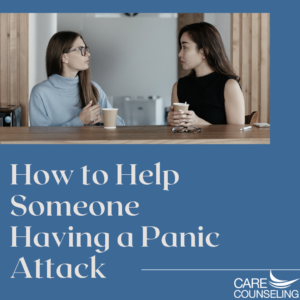How to Help Someone Having a Panic Attack
 Witnessing a loved one or a friend experiencing a panic attack can be a distressing and helpless feeling. However, your support and guidance can make a significant difference in helping them navigate through this overwhelming experience. In this blog, we will discuss effective ways to assist and comfort someone having a panic attack.
Witnessing a loved one or a friend experiencing a panic attack can be a distressing and helpless feeling. However, your support and guidance can make a significant difference in helping them navigate through this overwhelming experience. In this blog, we will discuss effective ways to assist and comfort someone having a panic attack.
- Stay Calm
Your calm presence can have a soothing effect on the person experiencing the panic attack. It’s essential to remain composed and patient, even though it might be challenging to see them in distress.
- Encourage Them to Breathe
Panic attacks often involve rapid and shallow breathing, which can worsen symptoms. Encourage the person to take slow, deep breaths. You can lead by example, taking deep breaths yourself to demonstrate the technique.
- Be Non-Judgmental
Assure them that you are there to support them without judgment. Avoid saying things like “calm down” or “it’s all in your head,” as these can be dismissive and unhelpful.
- Create a Safe Space
If possible, guide the person to a quiet and safe place where they can sit or lie down. Reducing external stimuli can help them feel more secure.
- Offer Physical Comfort
Physical touch can be reassuring. If the person is comfortable with it, you can offer a comforting touch like holding their hand or placing a hand on their back. Always ask for consent before offering physical contact.
- Use Calming Language
Speak in a calm and soothing tone. Reassure them that you are there to help and that the panic attack will pass. You can say things like “I’m here with you” or “You’re safe.”
- Help Them Focus
Panic attacks often come with racing thoughts and feelings of dread. Encourage the person to focus on their breathing or a specific object in the room. This can redirect their attention away from the panic.
- Avoid Crowds and Pressure
If the panic attack is occurring in a crowded or overwhelming environment, try to create some distance between the person and the source of stress. Provide a buffer and avoid pressuring them to engage with others.
- Don’t Minimize Their Feelings
Acknowledge the intensity of their experience. Avoid statements like “It’s not a big deal” or “You’re overreacting.” Instead, validate their feelings and reassure them that you are there to support them.
- Stay Patient
Panic attacks can last for several minutes, and it’s crucial to remain patient throughout. Continue offering your presence and support until they begin to feel better.
- Offer Water
Sipping on water can help alleviate some physical symptoms of a panic attack. If the person is willing, provide them with a glass of water.
- Avoid Touching Their Face
Some people may find it uncomfortable or invasive to have their face touched during a panic attack. Always respect their boundaries and preferences.
- Stay with Them
Stay with the person until the panic attack subsides, and they begin to feel better. Offer to help them afterward, whether it’s finding a quiet place to sit or assisting with any practical needs.
- Suggest Professional Help
After the panic attack has passed, gently suggest that they consider seeking professional help if they haven’t already. Therapy, particularly cognitive-behavioral therapy (CBT), can provide valuable tools for managing panic attacks.
- Follow Up
Check in on them later to see how they are feeling. Let them know that you care and are there to support them in the long run.
Helping someone through a panic attack requires patience, empathy, and a calm presence. Your support can make a world of difference to them during this challenging experience. It’s essential to prioritize their well-being and encourage seeking professional help when necessary.



























